We’ve all seen the headlines: inflation at its highest point in almost 30 years; interest rates are rising, and the energy cap has been lifted. Everyone is on tenterhooks to see what it will mean for their bank balance, and of course, landlords and tenants are going to be affected.

Nobody quite knows how things will turn out, but the forecasts are stark. It is estimated that 7 million people will fall into financial difficulty and that this will rise to 14 million if prices rise again in October as expected. Just in time for winter…
So, what can landlords do to get ahead of the problem? The short answer is “act now”. The longer answer is “actually, quite a lot”.
To get you started, this week’s blog is chock-a-block with practical tips on how you can work together with your tenant to make things easier for them while still protecting your income, investment and costs.
Remember that you’re always welcome to get in touch about life as a landlord. Call us on 01722 580059 or email us at info@piccoloproperty.co.uk – we’re here to help.
START WITH A HEART-TO-HEART
Checking in with your tenants to find out where they’re at will prevent an uncomfortable silence from brewing. You can solve a lot with a friendly chat, and you could nip a problem in the bud before it ever escalates.
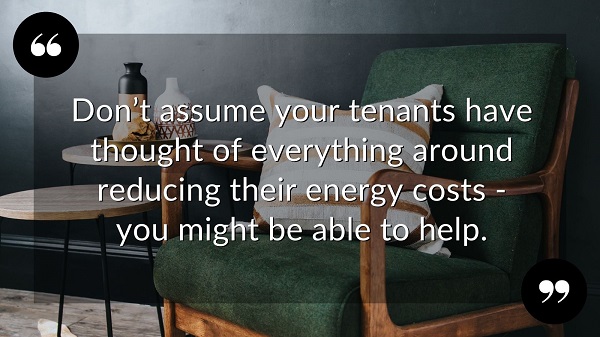
Aim for an easy and open conversation; a good-natured fact-finding exercise to see where things stand. Don’t assume your tenants have thought of everything around reducing their energy costs and they may really welcome any help or advice you can give them.
- Are they worried about their personal situation?
- Do they have an idea of what their energy bill is likely to be?
- Is there a better energy deal out there for them?
- Are there any opportunities for them to manage their bills?
The key is to listen with an understanding ear. When your tenants feel free to be completely upfront, you can work together on the best way forward for both of you.
MAKE YOUR RENTAL PROPERTY CHEAPER TO RUN
Having explored how your tenants can reduce their energy consumption and costs, now is a sensible time to review the energy efficiency of your buy-to-let.
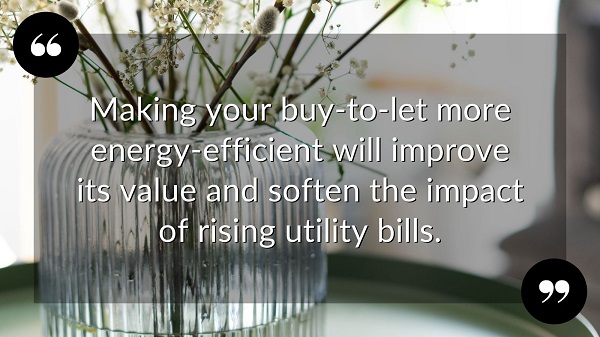
As well as softening the impact of rising utility bills, energy improvements can increase the value of your investment, future-proof its place in the market and give you a head start on any further energy-saving legislation.
Even the tiniest draught can cause a noticeable drop in temperature and comfort. Windows, doors, letterboxes, keyholes and chimneys are all potential gateways for heat loss, yet plugging draughts is one of the most cost-effective measures you can take with instant benefits and minimal disruption.
The same is true of flow restrictors on taps and showerheads, and fixing or replacing leaky fittings. The less hot water they use, the lower the energy bill.
Are any older appliances due for renewal soon? Replacements are tax-deductible, and A+ rated models are highly energy-efficient, particularly from brands like Bosch, Neff and AEG.
Finally, never underestimate the power of a well-placed note for creating new habits. Friendly reminders on the washing machine, dishwasher and heaters with eco-friendly tips will ensure your tenants get the maximum financial benefit.
CAN YOU BE FLEXIBLE OR PIVOT?
The race for space to get a garden or an extra room to work from home saw many tenants stretch their budgets during the pandemic, but some may need to review their choice as they look to reduce their outgoings.
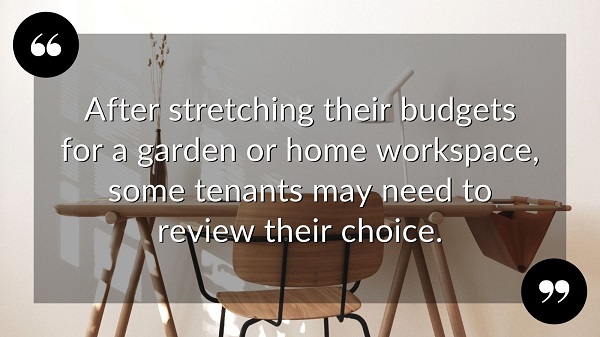
If it’s clear your tenant will run into financial difficulty, there’s little point in forcing them to stay and waiting for arrears to build. Demand for rental property is still extremely high, so you could strike a deal with your tenant to keep the place tidy for viewings in exchange for leaving early once you find a replacement.
This could be an opportunity to have more income-earning tenants who split the bills. For instance, couples or sharers for a two-bedroom apartment rather than a single person using one of the bedrooms as a workspace.
Stay open-minded – the most important thing is that your property is rented to people who pay the rent and take care of your investment.
THINK ABOUT RENT STABILITY
If the tenancy at your buy-to-let is either approaching or past the end of its initial fixed-term, you could be wondering whether to keep things as they are, announce a rent increase, or end the tenancy.
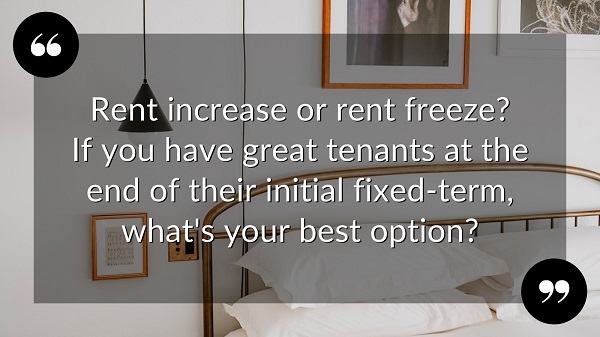
According to the research team at Hamptons, record-breaking rental growth in 2021 saw the average UK household spend 42% of its net income on rent (rising to 54% in London) - the highest ratio since Hamptons began keeping records in 2010.
Most tenants won’t have budgeted for a surge in food and energy prices, and the rising cost of living is expected to translate into slower rental growth in 2022 as disposable income dwindles. Zoopla forecasts an average rise of 4.5%, compared to last year’s 7.5%.
Landlords value stability, and although annual rent reviews are par for the course, we’re in very unpredictable times. If you’ve got a fantastic tenant who’s punctual with payments, takes care of your property and wants to stay, would it be wise to keep them on at the same rent?
You wouldn’t be alone in that choice: the buy-to-let consultancy GetGround surveyed hundreds of UK landlords and found that 69% wanted to help their tenants through the cost-of-living crisis, including temporary rent freezes.
Before you make any decisions, talk to your letting agent about the current rental value of your property, then factor in the upfront costs of finding a new tenant, the possibility of vacant days between tenancies, and what you feel in your heart and your head. Then you can decide what makes the most sense for you.
PROTECT YOUR INCOME & INVESTMENT
Even if everything’s running smoothly with your buy-to-let, the cost-of-living crisis could bring unwelcome news. For example:
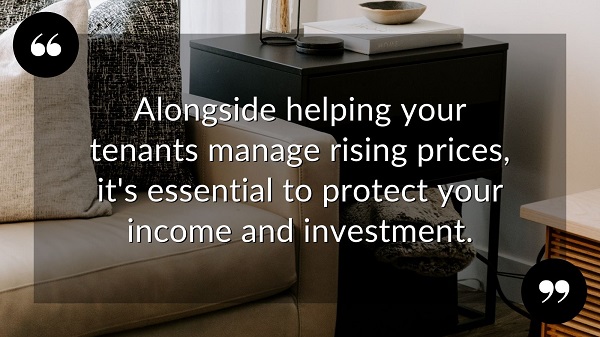
- energy prices rise again
- inflation keeps going up
- mortgage interest rates increase further
- the rent stops being paid
- you incur legal costs to gain possession
If you have a buy-to-let mortgage, a quick look at your existing deal compared to current offers will tell if you can make a saving. Even with a fixed rate that’s still got a few months to go, you could lock in a new deal to start when the old one ends.
Taking steps to protect your income and investment is particularly wise right now. Although we aren’t experiencing problems with the homes we manage, we’re keeping an ear to the ground, and arrears are on the rise.
A recent article in the Telegraph states: “Between October and December 2021, the average time between a landlord repossession claim and an eviction was 68 weeks”. That’s a long time to be without rent.
As a safeguard, you could take out insurance to guarantee your income if your tenant stops paying. A legal protection policy will also cover you in a worst-case scenario of needing the courts and solicitors to gain possession of your property.
Given the forecast for the difficult road ahead, paying a small percentage of your rent for complete peace of mind might feel like an attractive option. Feel free to get in touch to see how our landlord clients are protecting themselves and what could be the best option for you.
What’s your next step?
Being positive and proactive through all that’s going on will help you stay ahead of potential problems, enhance your rental properties and maintain their profitability. That’s always our approach, and why our landlords are so happy!
Would you like the same care and commitment? If you’re a landlord in the Wilton or Salisbury area, give us a call on 01722 580059 or send us a message to info@piccoloproperty.co.uk – we’d love to show you how we can make a difference in your life.


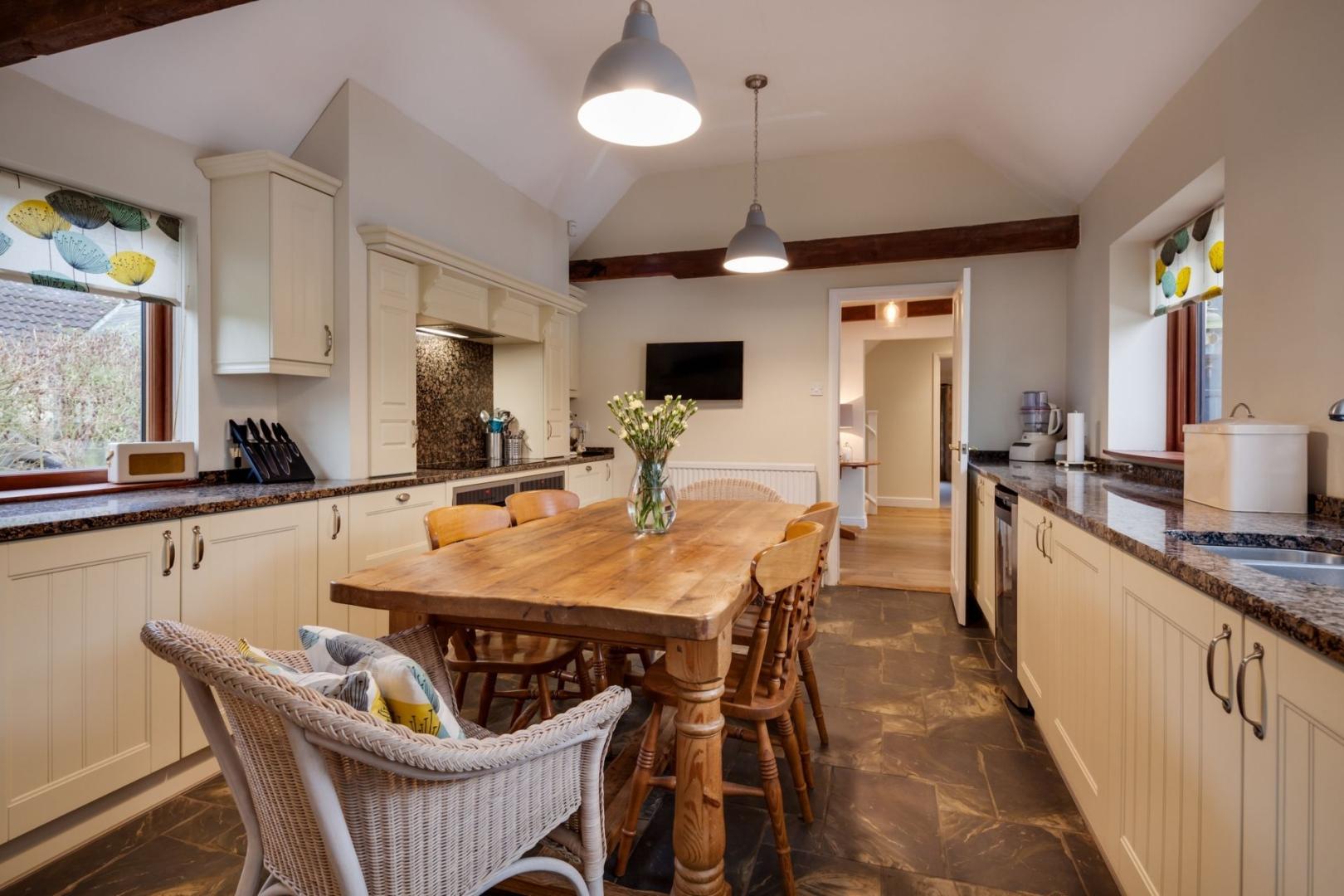



Share this with
Email
Facebook
Messenger
Twitter
Pinterest
LinkedIn
Copy this link